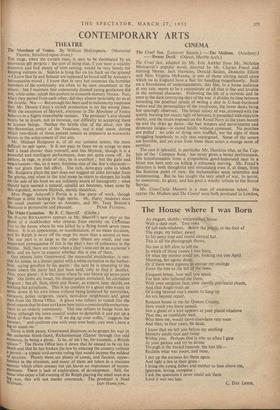CINEMA
The Cruel Sea. (Leicester Square.)—The Medium. (Academy.) —Bwana Devil. (Odeon, Marble Arch.)
The Cruel Sea, adapted by Mr. Eric Ambler from Mr. Nicholas Monsarrat's popular novel, directed by Mr. Charles Frend and starring Messrs. Jack Hawkins, Donald Sinden, Denholm Elliott and Miss Virginia McKenna, is one of those stirring naval epics which we in England have a flair for handling magnificently. Built on a foundation of understatements, this film, to a home audience at any rate, seems to be a concentrate of all that is fine and lovable in the national character. Following the life of a corvette and its crew in the dark convoying days of the war, it divides its time between recording the practical details of soiling a ship in U-boat-burdened waters and the personalities of the wardroom, the lower decks being but sparingly observed. The brutal idiocy of war, crowned with the quietly burning but steady light of heroism, is presented With objective clarity, and the strain imposed on the Royal Navy as the years mount up and the ships go down—the bad tempers and nerve-storms and desperate fatigue—is stated baldly without comment. No punches are pulled ; no cries of dying men muffled, nor the sight of them struggling hopelesSly in oily seas expurgated. Some of the scenes are horrible, and yet even from these there arises a strange sense of comfort.
The cast is splendid, in particular Mr. Hawkins who, as the Cap. tam of the Compass Rose,' has never given a better performance. His transformation from a sympathetic good-humoured man to a bitter one bent only on killing is extremely moving. Mr. Freud's direction is both thoughtful and stimulating even if, at times, from the feminine point of view, the technicalities seem reiterative and uninteresting. But he has caught the very smell of war, its terror, its monotony, its glory, and has ,paid a worthy tribute to the Senior Service.
Mr. Gian-Carlo Menotti is a man of enormous talent. His operas The Medium and The Consul were both produced in London, and aroused strong feelings ranging from worship to revulsion. He has now, without any previous acquaintance with the cinema, directed a film version of The Medium, tackling the task not only with courage, but with an instinctive understanding of the screen's possibilities. With bold daring strokes he has painted a terrifying over-life-size picture of a charlatan, and in spite of the limitations of opera—of his music which is of doubtful value and his words which are prosaic —has concocted something profoundly impressive. Miss Marie Powers as the bogus medium who, in one of her pseudo-seances, feels a hand at her throat and herself becomes haunted to the point of insanity, gives an outstanding performance, not so much vocally as histrionically. Drunk, blowsy, scared to death and photographed in cruel detail, she makes a violent assault upon the mind. As her daughter, Miss Anna Maria Alberghetti, as yet ungroomed by Hollywood, lends her youth and her voice to unrestrained emotion, the only pity being that it is quite impossible to understand a single word she is singing. Mr. Leo Coleman as a deaf-mute gypsy— Mr. Menotti's imagination knows no barriers—is also admirable, adding an extra note of weirdness, indeed of abnormality, to a film already larynx-deep in the macabre. And talking of the macabre, to judge from the queues outside the Marble Arch Odeon there are now many hundreds of new sufferers from eye-ache, many hundreds of people for whom the novelty of a three-dimensional film has spelt cracking neuralgia. That the " deepy " has a great ;future is certain, and that we shall soon be taking Miss Jane Russell in the round for granted assured ; but, as a herald of joys to come, Mr. Arch Oboler's Bwana Devil has to be seen with an eye strained, among other things, with faith. Let us hope it is technically very imperfect. One cannot believe that the sensation of queasiness it produces is intentional. When this and a magnetic pull squint-wise on the eyeballs have been overcome, the startling effect of depth can be judged on its own merits. At the moment no critic, in the grip of nausea, can possibly give a fair



















































 Previous page
Previous page